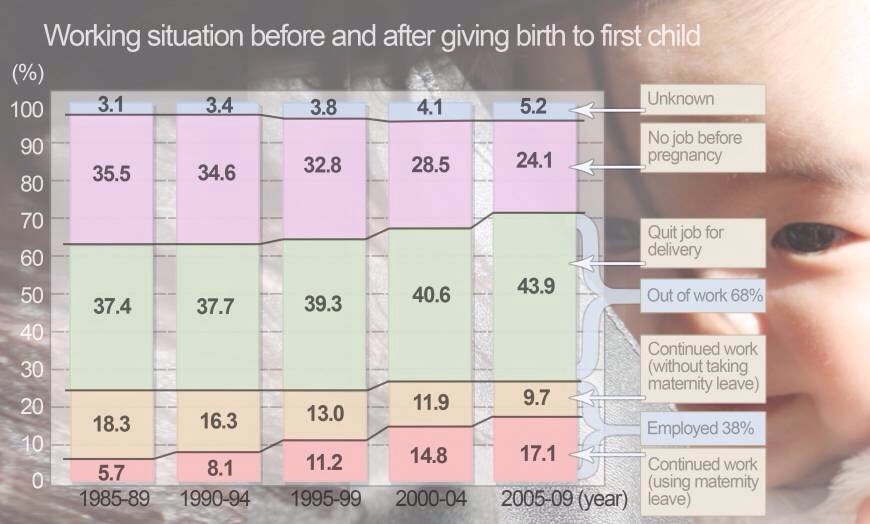弁護士加藤佳子東ゼン労組執行委員長奥貫妃文は産後産前休暇とマタハラパタハラを講義する。
Attorney Kato Keiko and Tozen President Hifumi Okunuki teach us about the law and legal cases around maternity leave, and maternity and paternity harassment.
弁護士加藤佳子東ゼン労組執行委員長奥貫妃文は産後産前休暇とマタハラパタハラを講義する。
Attorney Kato Keiko and Tozen President Hifumi Okunuki teach us about the law and legal cases around maternity leave, and maternity and paternity harassment.
Last Thursday’s Supreme Court verdict in the “maternity harassment” case brought by a physical therapist in Hiroshima was the first of its kind, overturning decades of business-friendly jurisprudence along with rulings from the district and high courts.
As I mentioned in last year’s September Labor Pains (“Mata-hara: turning the clock back on women’s rights”), the word mata-hara is short for maternity harassment, just as seku-hara and pawa-hara refer to sexual harassment and power harassment, respectively. Maternity harassment means workplace discrimination against pregnant or childbearing women, including dismissal, contract nonrenewal and wage cuts.

Matahara: turning the clock back on women’s rights
‘Maternity harassment‘ concept coined amid reports of bullying over pregnancy at work
BY HIFUMI OKUNUKI
“When I told my company I was pregnant, they fired me.”
“I was delighted to be hired by a company I loved. Then my boss made me promise not to get pregnant for a while.”
In last October’s Labor Pains, I discussed maternal job rights in “Labor law protects expectant and new mothers — to a point.” Today, I would like to address a new legal concept known as “maternity harassment,” or matahara, in the syllabic acronym engendered by this growing — and disturbing — trend.
http://www.japantimes.co.jp/text/fl20121016lp.html
Tuesday, Oct. 16, 2012
I had a labor consultation with a woman who said: “The other day I told my company I was pregnant. My boss asked me to quit because the firm can’t afford to give me time off. One of my coworkers once resigned before giving birth but I want to stay on. Do I have to quit now that I am pregnant?”
The short answer is no. The longer answer is: no way.
Today’s labor laws do not permit the dismissal of a woman for being pregnant; neither do they allow her to be asked to resign. Labor Standards Law Article 65, Sections 1 and 2, mandate maternity leave as follows: “An employee may take the six weeks before birth as leave, while the employer must not allow her to work for the eight weeks after birth (excepting the last two weeks of that period, during which she may work if she requests it and has a doctor’s note permitting it).”
Article 19 also prohibits dismissal for the first 30 days upon her return to work. Equal Employment Opportunity Law Article 9 also shifts the burden onto the employer to prove that the reason for dismissing a pregnant woman is something other than the pregnancy itself. Without proof, the dismissal is invalid.
The article also prohibits any kind of disadvantageous treatment of women who take maternity leave as prescribed. Such prohibited treatment includes pay cuts, demotions, status changes from seishainregular to irregular employee, transfers, suspensions, lower bonus payment, bad evaluations, etc.
Two cases dominate jurisprudence and the law journals on this issue.
Nihon Schering K.K. is the Japanese subsidiary of a German pharmaceutical firm. Twenty-four employees sued the company for lost wages due to one clause of a labor management agreement (LMA) between the drug maker and the No. 2 Union that read: “Any days off for maternity leave, menstruation leave, childcare leave or paid holidays will be counted when calculating attendance rates, and any worker with less than 80 percent attendance will be denied promotions and pay raises.”
The Supreme Court’s Petty Bench ruled on Dec. 14, 1989, that “any provision that suppresses the right to holidays guaranteed by law violates kōjo (public morals) and is therefore invalid,” a victory for the plaintiffs.
Fourteen years later, the same bench cited the above case to reach a more ambiguous verdict.
An employee of Toho Gakuen (Toho Academy) sought to recover two bonuses denied her because she took eight weeks off for maternity leave and then reduced her work hours because of subsequent childcare commitments. On Dec. 4, 2003, the judge overturned the wage regulation that deprived her of the bonuses but permitted the school to prorate the bonus, reducing it in proportion to the hours and days she was off.
The court’s logic was based on Article 65 of Labor Standards Law, which does not require that the leave itself be paid, so long as there are no other deductions. (This is similar to the law on strikes, which prohibits any disadvantageous treatment but does not require that the time struck be paid.)
The cut in her bonus payments proved to be deep for the woman working at Toho Academy, since the bonuses had accounted for more than 30 percent of her annual income. Such cuts to income discourage us women to have and raise children — not good news in a society that needs more children.
Maybe the Supreme Court should take a bit broader view and consider the financial “labor pains” involved in having a child.